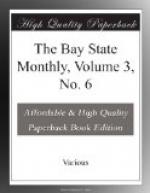“Miss Field is probably the best posted person, outside the high Mormon church officials, and others who have been in the church, on this institution, in the world, and its effects upon men, women and governments. With a fixedness of purpose which nothing could swerve, and with an energy which neither storm, mud, snow, cold looks, the persuasions or even the loss of friends, could for a moment dampen, she has held on her course. In the tabernacle, in the ward meeting house, in the homes of high Mormons, and, when these were closed to her, in the homes of the poor, she has worked upon the theme, while every scrap of history which offered to give any light upon the Mormon organization she has devoured. Mormonism has been to her like a fever. It has run its course and now she is going away. If she proposes to lecture, she ought to be able to prepare a better lecture on Mormonism than she has ever yet delivered; if a book is in process of incubation it ought to be of more value than any former book on this subject. Lecture or book will be intense enough to satisfy all demands. The ‘Tribune’ gives the world notice in advance that Miss Field has a most intimate knowledge of the Mormon kingdom.”
Returning to the East she stopped on the way in Missouri and at Nauvoo, Illinois, looking up all the old camping-grounds of Mormonism, and meeting and interviewing people who had been connected with it, including two sons of Joseph Smith, Miss Field opened her course of lectures on this subject in Boston last November, before a brilliant and distinguished audience, including the Governor and other officials of state, Harvard University professors, and men and women eminent in art, literature and society. She dealt with the political crimes of the Mormons, arguing that the great wrong was not, as many had believed, polygamy, but treason! Polygamy, though “the cornerstone of the Mormon church,” was not inserted in its printed articles of faith and was not taught until the unwary had been “gathered to Zion.” The monstrosity of the “revelation” on celestial marriage; the tragic unhappiness of Mormon women; the elastic conscience of John Taylor, “prophet, seer and revelator” to God’s chosen people, were vividly depicted. Her extracts from Brigham Young’s sermons, and from those of his counsellors, are forcible arguments on the Gentile side. Indeed, throughout her entire discourse, Miss Field clinches every statement with Mormon proof, rarely going to Gentile authorities for vital facts connected with her subject. The lecturer’s sense of humor betrayed itself now and then, when, with fervor, she related an incident in her own experience, or quoted a “Song of Zion.” The refrain of one of these songs still rings in our ears:
Then, oh, let us say
God bless the wife that strives
And aids her husband all she can
To obtain a dozen wives!




